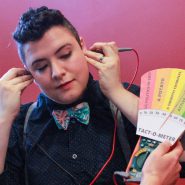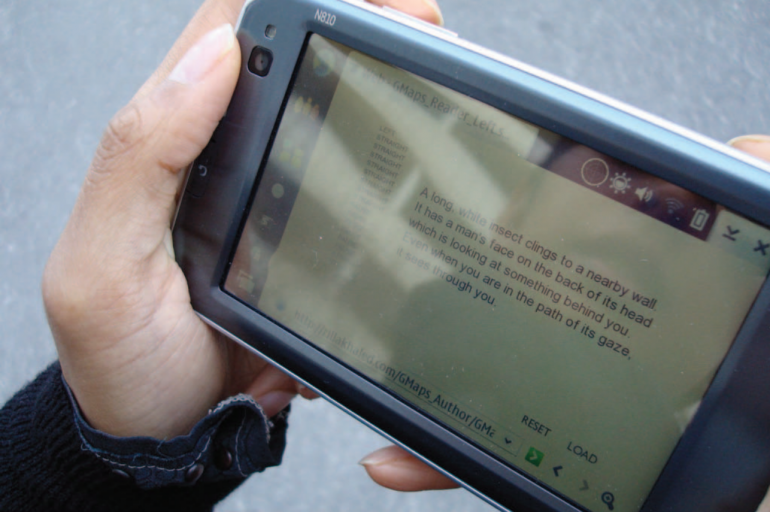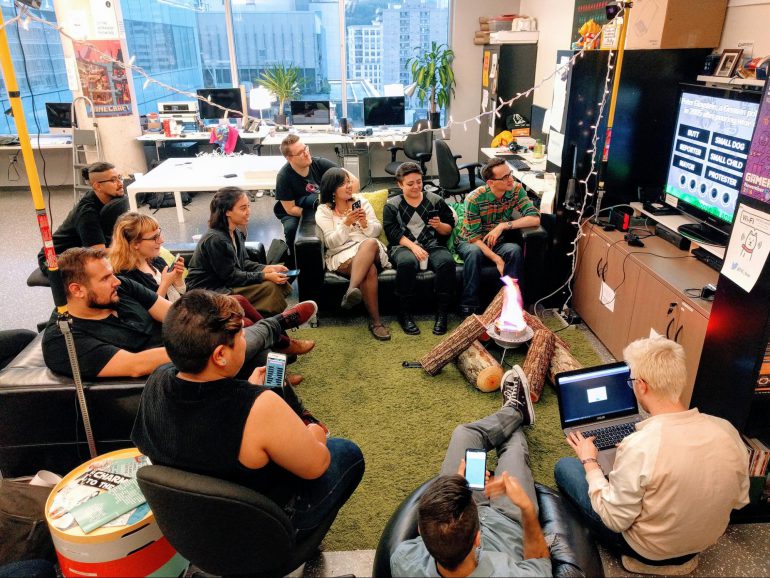 TAG Profiles is a blog series that explores the work of current TAG scholars. Jess Marcotte is a PhD candidate in Concordia’s INDI program, and one of TAG’s two student representatives.
TAG Profiles is a blog series that explores the work of current TAG scholars. Jess Marcotte is a PhD candidate in Concordia’s INDI program, and one of TAG’s two student representatives.
What is your research focus here at Concordia?
I have an interest in intersectional feminist and queer game design practices. Those philosophies and ways of making are embedded in my practice and inform what I do. Specifically, I make physical physical/digital hybrid games – which may sound weird because it’s not as if digital games aren’t physical anyways – but the physical components of my games are more visible than what’s found in most digital games. They also offer a pretty different physicality than what we expect from a videogame in general. For example, these games may include unusual interfaces or they may highlight the interface in an effort to make it visible again. When we use a keyboard, a mouse, or a touchscreen, for example, we often overlook what it means to engage with that interface.
Another research interest I have is related to how archival practices and autoethnography are related to the design practice. This was inspired by how physical my projects are, oftentimes involving handmade components and elements that are not easy to reproduce. Many alternative controller projects wind up in somebody’s basement or eventually get broken, thrown out, or lost. It becomes a sort of lost history of games that were made at festivals, game jams, and other venues. One of the traces I’m concerned with is instructions for how to make your own version of a game – but really, I’m interested in as many different kinds of traces as possible to give these projects a life beyond the two or three years that they tour conferences or exist in someone’s lab.
Were you interested in games before you came to academia?
I would say that the archival interests in particular are ones that developed through my research, mainly as a result of working with materials and being really sad that I couldn’t play so many games that I had heard about because they didn’t exist anymore. And then, more broadly, being worried about what that meant for any body of work in this area.
My undergrad and masters were actually focused on a different kind of archival/preservation practice. My master’s work in particular was about a community of scuba divers, and trying to kind of translate the technical language of scuba diving into something that, while not erasing it, making it understandable to the average person. Also, I tried to take the oral history and stories that we tell each other when we’re sitting around on boats and having soda and BBQ, and turn them into something that could be shared with other people.
You are currently working on a game as part of your PhD research. Could you tell me a little bit about it?
The project’s work-in-progress name is TRACES. It is a game about being a trans time traveler, who arrives in something like our current modern era and uncovers traces of other time travelers and their experiences. It’s changed a lot since I started working on it in September. The world has gotten to be a visibly less friendly place for trans people in many ways, which is really changing the writing. The game that is almost like a walking simulator without the simulation, in that I’m going to ask players to physically explore space and scan objects with nearfield communication technology to uncover the narrative.

Would the game fall under the category of augmented reality?
It’s definitely an augmented reality game, which is something I’ve been interested in making for a while but never fully had the chance to explore. Pippin Barr and Rilla Khaled worked on a project with Brian Greenspan called StoryTrek, which was one of the very first things I encountered when I came to games academia. I took a StoryTrek workshop at a graduate student conference at Carleton and ever since then it’s kinda been sitting in the back of my mind as something that would be cool to explore.
How does TAG help you realize the goals of your project?
Having a space like TAG means coming into a room and having, at any given time, half a dozen friendly people who are willing to talk to you about your research and collaborate with you. Alternatively, sometimes we just all put our heads down and work – which is often exactly what I need for motivation. When I come to TAG, I am always so much more productive than when I’m working at home! For this project in particular, TAG has also purchased some tech for me to experiment with to see if it is right fit for my game. Although there are so many helpful resources, it really is about the people. Being in a space – a collaborative space – with other people who are interested in some things that are similar to you (but also some things that are very different), that exposure is generative for me. Very inspiring and very creative!

TAG is a space that is helped me grow a lot as a maker and a designer because I’m always suddenly involved in projects that I’ve never expected, and that’s kinda amazing.
How can people follow you online?
You can follow me on Twitter at @jekagames. I also have a website, where you can find my games and follow my writings on gaming, autoethnography, critical making, my dissertation, and my research.
